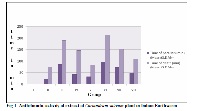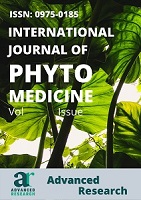Anthelmintic activity of extracts of Coriandrum sativum linn. In indian earthworm
Keywords:
CSL, Paralysis, death of earthwormAbstract
Coriandrum sativum Linn. (CSL) is popularly known as coriander in India belongs to family Apiaceae. The objective of the present work was to evaluate the in-vitro anthelmintic potency of the ethanolic extract and carbon tetrachloride extract of Coriandrum sativum Linn. plant using Indian earthworms (Pheretima posthumad). The various concentrations (50, 100, and 150 mg/ml) of the ethanolic extract and carbon tetrachloride extract were tested in-vitro for anthelmintic potency by determination of time of paralysis and time of death of worm. Piperazine citrate (15mg/ml) used as standard. The result of present study indicates that the Coriandrum sativum Linn. potentiate to paralyze earthworm and also caused its death after some time. The shortest time of paralysis was observed at higher dose (150 mg/ml) of both ethanolic extract and carbon tetrachloride were found to 28 min and 45 min respectively. The results of the study are comparable to standard Piperazine citrate. The result showed that ethanolic extract of Coriandrum sativum Linn. took less time to cause paralysis of the earthworm than that of carbon tetrachloride extract Coriandrum sativum Linn.. Thus the present study demonstrate that the Coriandrum sativum Linn. as an anthelmintic has been confirm as the ethanolic and carbon tetrachloride extracts of whole plant displayed activity against the earthworm used in study.
References
Kamrun Nahar, Muhammad Ashikur
Rahman, Most. Nazma Parvin1 and
Shammy Sarwar Evaluation of
Anthelmintic Activity of Aqueous Leaf
Extract of Clitoria ternatea Linn. S. J.
Pharm. Sci. 3(1):46-48.
Kapoor LD, Hand book of ayurvedic
medicinal plants :Herbal reference
Library, USA, Florida, CRC Press ,
;pp 82
Al-Mofleh IA, Alhaider AA, Mossa JS,
Al- Sohaibani MO, Rafatullah S and
Qureshi S. Protection of gastric mucosal
damage by Coriandrum sativum L.
pretreatment in wistar albino rats,
Environ. Toxic. And Pharmacology
;22 64-69.
Begnami AF, Duarte MCT, Furletti V and
Rehder VLG. Antimicrobial potential of
Coriandrum sativum L. against different
Candida species in vitro, Foodchem.
;118:74-77.
Gupta S, Raghuvanshi M and Jain D.
Comparative studies on anti-inflammatory
activity of Coriandrum sativum, Datura
stramonium and Azadiracta indica,Asian
J.Exp. Biol. Sci., 2010;Vol(1):151-154.
Ajayeoba EO, Oncha SA, Olarenwaju
OT. In vivo anthelmintic property of
Buehholria cariacen & Gyandropis
gyancha ext., Pharm Biol., 2001;39:127-
Guha P. Betel leaf: The neglected green
gold of India. J. Hum Ecol., 2006;19(2).
Chopra RN, Nayer SC, Chopra IC.
Glossary of Indian medicinal plants.
CSIR, NewDelhi, 1956;160p.
Kelly JD and Hall CA. resistance of
animal helminthes to antihelmintics , Adv.
Pharm.Ther ., 1979;16:ppS9-S12.
Dash OK, Suresh P, Kar DM, Ganpaty S
and Panda SP. Evaluation of Evolvulus
alsinoids Linn,for anthelmintics and
antimicrobial activities, J N at SRem.,
;2:pp.182-185.
Jain MN and Jain SR. therapeutic activity
of Ocimum basilicum var. album,Planta
Med., 1972;22:pp.66-70.
Okon ED, Ogunsusi RA and Fabiyi JP.
Survey and feasibility studies on
fascioliasis and parasitic gastroenteritis of
ruminants in Nigeria, Federal Livestock
Department of Nigeria Report 1980.
Singh D, Swarnkar CP, Khan FA.
Anthelminthicresistance in
gastrointestinal nematodes in livestock in
India. J Vet Parasit 2002;16:115-130.
Goodman LS. Gilman A. The
Pharmacological basis of
Therapeutics.10th Edn. Mcgraw Hill
Medical Publishing Division, New York,
;1121p.
Tripathi KD. Essential of Medical
Pharmacology. 4th Edn. Jaypee
Publication, New Delhi, 2006;816-817



